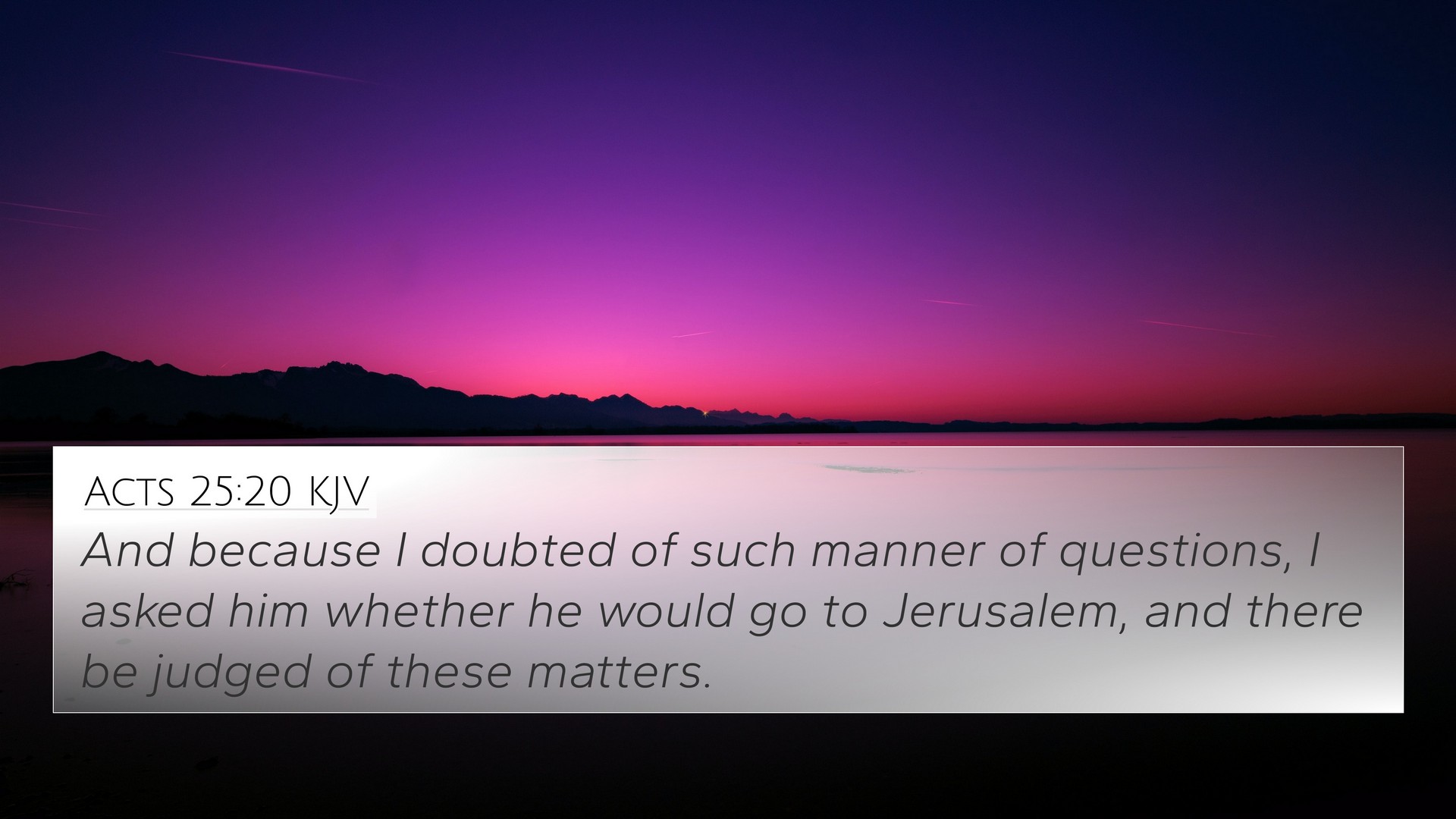Old Testament
Genesis Exodus Leviticus Numbers Deuteronomy Joshua Judges Ruth 1 Samuel 2 Samuel 1 Kings 2 Kings 1 Chronicles 2 Chronicles Ezra Nehemiah Esther Job Psalms Proverbs Ecclesiastes Song of Solomon Isaiah Jeremiah Lamentations Ezekiel Daniel Hosea Joel Amos Obadiah Jonah Micah Nahum Habakkuk Zephaniah Haggai Zechariah MalachiActs 25:20 Similar Verses
Acts 25:20 Cross References
And because I doubted of such manner of questions, I asked him whether he would go to Jerusalem, and there be judged of these matters.
Uncover the Rich Themes and Topics of This Bible Verse
Listed below are the Bible themes associated with Acts 25:20. We invite you to explore each theme to gain deeper insights into the Scriptures.
Acts 25:20 Cross Reference Verses
This section features a detailed cross-reference designed to enrich your understanding of the Scriptures. Below, you will find carefully selected verses that echo the themes and teachings related to Acts 25:20 KJV. Click on any image to explore detailed analyses of related Bible verses and uncover deeper theological insights.

Acts 25:9 (KJV) »
But Festus, willing to do the Jews a pleasure, answered Paul, and said, Wilt thou go up to Jerusalem, and there be judged of these things before me?
Acts 25:20 Verse Analysis and Similar Verses
Understanding Acts 25:20
Acts 25:20 states, "And because I was uncertain of how to investigate these questions, I asked whether he would be willing to go to Jerusalem and be tried there on these charges." This verse highlights the complexities surrounding legal proceedings in the early Church and reflects the challenges faced by Paul as he navigated accusations against him. Below, we delve into the meanings derived from esteemed public domain commentaries, presenting an in-depth analysis through a scriptural lens.
Summary of Commentary Insights
Through the lens of Matthew Henry, Albert Barnes, and Adam Clarke, we explore the intricacies of this verse.
Matthew Henry's Perspective
Matthew Henry notes that this verse portrays the uncertainty that permeated the trial process. The Roman governor, Festus, found himself at a crossroads, reflecting on his inability to grasp the details of the accusations against Paul. This uncertainty exemplifies the tension between Roman law and emerging Christian beliefs. Henry emphasizes that Festus's suggestion to send Paul to Jerusalem was fraught with peril, highlighting the continual dangers early Christians faced from both Jewish authorities and Roman governance.
Albert Barnes' Insights
Albert Barnes elaborates that Paul’s appeal to be tried in Rome indicates his understanding of the potential bias in Jerusalem, outlining Paul's strategic thinking in safeguarding his rights as a Roman citizen. Barnes interprets the political maneuvering of Festus as a reflection of broader themes of justice and the quest for truth, underlying the necessity for a fair trial amidst swirling suspicions and political implications.
Adam Clarke's Analysis
Adam Clarke emphasizes the role of divine providence in Paul's circumstances. He notes that Paul's situation, coupled with the Roman legal system's complexities, showcases how God orchestrated events to facilitate the spread of the Gospel. Clarke highlights the importance of understanding biblical context; acts of injustice often became stepping stones for the fulfillment of God’s plan, turning obstacles into opportunities for testimony.
Significant Cross-References to Acts 25:20
- Acts 22:25: Paul asserts his rights as a Roman citizen.
- Acts 24:20-21: Paul’s defense before Felix.
- Acts 26:31: The response to Paul’s defense before Agrippa.
- Romans 13:1-5: The Christian's relationship with governing authorities.
- John 18:31: The Roman Pilate’s role in judgment.
- Philippians 1:7: Paul’s partnership in the defense of the Gospel.
- 1 Peter 3:15: Always be ready to give an answer for the hope within.
Connections Between Bible Verses
Acts 25:20 serves as a pivotal point in understanding the legal context of Paul's ministry. The verse connects deeply with:
- Galatians 1:10: Paul’s identity as a servant of Christ over men.
- 2 Timothy 4:17: Paul being delivered from the mouth of the lion while standing trial.
- Matthew 10:16: Being wise as serpents and innocent as doves, relevant to Paul’s situation.
Thematic Bible Verse Connections
The themes of justice, divine guidance, and the pursuit of truth resonate throughout the Bible. Acts 25:20 illustrates these themes vividly:
- Justice: Reflects the ongoing struggle for fair trials, as seen in John 7:24.
- Divine Providence: Echoed in Proverbs 16:9 where the Lord directs human paths.
- Defense of Faith: Seen in 1 Corinthians 9:16 where necessity is laid upon Paul to preach the Gospel.
Comparative Bible Verse Analysis
Examining the relationships between these verses provides a rich context for understanding Acts 25:20:
- Acts 25:10: Paul’s rights weighed against false accusations.
- Matthew 5:11-12: Blessed are those persecuted for righteousness' sake.
- Philippians 1:29: Believers granted the privilege to suffer for Christ.
Tools for Bible Cross-Referencing
Understanding Acts 25:20 can be enhanced using various tools for cross-referencing:
- Bible Concordance: Use indexed references for specific words and themes.
- Bible Cross-Reference Guide: Track relationships between verses.
- Cross-Reference Bible Study: Engage in thematic studies across the scriptures.
How to Use Bible Cross-References
To maximize your study of Acts 25:20, consider these methods:
- Identifying connections between Old and New Testament: Explore parallels to deepen understanding.
- Comparative study of Pauline epistles: Analyze themes and arguments presented by Paul.
- Cross-referencing Psalms with New Testament teachings: Draw parallels with David’s cries for justice.
Conclusion
Acts 25:20 serves as a powerful reminder of the challenges faced by early Christians. Through the lens of commendable biblical scholarship and thematic exploration, we witness an unfolding dialogue between justice, faith, and divine intervention. The interconnectedness of scripture through cross-references allows believers to more fully grasp the depth of their faith and God's overarching narrative throughout the Bible.


